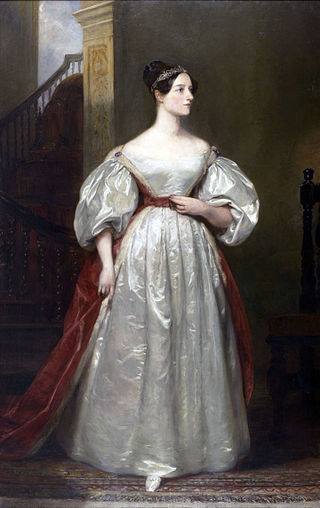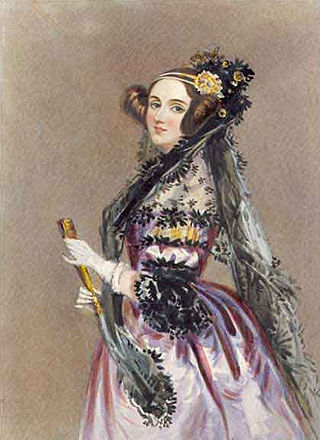Related Research Articles

Anita Borg was an American computer scientist celebrated for advocating for women’s representation and professional advancement in technology. She founded the Institute for Women and Technology and the Grace Hopper Celebration of Women in Computing.

Women in computing were among the first programmers in the early 20th century, and contributed substantially to the industry. As technology and practices altered, the role of women as programmers has changed, and the recorded history of the field has downplayed their achievements. Since the 18th century, women have developed scientific computations, including Nicole-Reine Lepaute's prediction of Halley's Comet, and Maria Mitchell's computation of the motion of Venus.

Maria Margaret Klawe is a computer scientist and served as the fifth president of Harvey Mudd College from 2006 to 2023. Born in Toronto in 1951, she became a naturalized U.S. citizen in 2009. She was previously Dean of the School of Engineering and Applied Science at Princeton University. She is known for her advocacy for women in STEM fields.

Justine M. Cassell is an American professor and researcher interested in human-human conversation, human-computer interaction, and storytelling. Since August 2010, she has been on the faculty of the Carnegie Mellon Human Computer Interaction Institute (HCII) and the Language Technologies Institute, with courtesy appointments in Psychology, and the Center for Neural Bases of Cognition. Cassell has served as the chair of the HCII, as associate vice-provost, and as Associate Dean of Technology Strategy and Impact for the School of Computer Science. She currently divides her time between Carnegie Mellon, where she now holds the Dean's Professorship in Language Technologies, and PRAIRIE, the Paris Institute on Interdisciplinary Research in AI, where she also holds the position of senior researcher at Inria Paris.

AnitaB.org is a global nonprofit organization based in Belmont, California. Founded by computer scientists Anita Borg and Telle Whitney, the institute's primary aim is to recruit, retain, and advance women in technology.
The Grace Hopper Celebration of Women in Computing (GHC) is a series of conferences designed to bring the research and career interests of women in computing to the forefront. It is the world's largest gathering of women and non-binary technologists. The celebration, named after computer scientist Grace Hopper, is organized by the Anita Borg Institute for Women and Technology. GHC 2022 conference was held hybrid in Orlando and virtually at the end of September 2022.
Susan Gerhart is a semi-retired computer scientist.

Carla Schlatter Ellis is an American computer scientist and Emeritus Professor of Computer Science at Duke University. She is known for her work in energy management on mobile devices as well as for her dedication to increasing the number of women in the field of computer science. She is one of the founding members of Systers, an international email list of female computer scientists that was founded in 1987. Systers, which was initiated by Ellis and 12 other female computer scientists who met at a Symposium on Operating Systems Principles (SOSP), has since grown to over 3000 members.
Many in Canada share concerns about the current and future roles of women in computing, especially as these occupations increase in importance. As in many nations where computing and information technology are large industries, women in Canada have historically faced underrepresentation in education and industry. As a result, some Canadian women pursuing careers in these fields have had a lack of role models and faced sexism. There are many institutions and initiatives in Canada, however, which seek to increase representation for women in computing fields, as well as the fields of natural science and engineering in general.

Tal Rabin is a computer scientist and Professor of Computer and Information Science at the University of Pennsylvania and a Director at Amazon Web Services (AWS). She was previously the head of research at the Algorand Foundation and the head of the cryptography research group at IBM's Thomas J. Watson Research Center.

This is a timeline of women in computing. It covers the time when women worked as "human computers" and then as programmers of physical computers. Eventually, women programmers went on to write software, develop Internet technologies and other types of programming. Women have also been involved in computer science, various related types of engineering and computer hardware.
Yuanyuan (YY) Zhou is a Chinese and American computer scientist and entrepreneur. She is a professor of computer science and engineering at the University of California, San Diego, where she holds the Qualcomm Endowed Chair in Mobile Computing. Her research concerns software reliability, including the use of data mining to automatically detect software bugs and flexible system designs that can adapt to hardware platform variations. She is also the founder of three start-up companies, Emphora, Pattern Insight, and Whova.
Janet Abbate is an associate professor of science, technology, and society at Virginia Tech. Her research focuses on the history of computer science and the Internet, particularly on the participation of women in the field. Janet Abbate is also the author of Inventing the Internet, Standards Policy for Information Infrastructure, and Recoding Gender Women’s Changing Participation in Computing. Janet Abbate also attended The University of Pennsylvania for her Ph.D.
Joanne Louise McGrath Cohoon was an American sociologist noted for her research on gender imbalance in computing.

The Association for Computing Machinery's Council on Women in Computing (ACM-W) supports, celebrates, and advocates internationally for the full engagement of women in all aspects of the computing field, providing a wide range of programs and services to ACM members and working in the larger community to advance the contributions of technical women. ACM-W is an active organization with over 36,000 members.

Kriti Sharma is an artificial intelligence technologist, business executive and humanitarian. As of 2018, she is the vice president of artificial intelligence and ethics at UK software company Sage Group. Sharma is the founder of AI for Good UK, which works to make artificial intelligence tools more ethical and equitable. Sharma has been named to Forbes magazine's 30 Under 30 Europe: Technology list, and appointed as a United Nations Young Leader. In 2018, she was appointed as an advisor to the UK's Department for Digital, Culture, Media and Sport. Sharma's initiatives include Pegg, an accounting chatbot, and rAInbow, a platform to support survivors of domestic violence. She has called for a philosophy of "embracing botness", arguing that artificial intelligence should prioritize utility over human resemblance.

Gender disparity in computing concerns the disparity between the number of men in the field of computing in relation to the lack of women in the field. Originally, computing was seen as a female occupation. As the field evolved, so too did the demographics, and the gender gap shifted from female dominated to male dominated. The believed need for more diversity and an equal gender gap has led to public policy debates regarding gender equality. Many organizations have sought to create initiatives to bring more women into the field of computing.
Margaret M. Burnett is a computer scientist specializing in work at the intersection of human computer interaction and software engineering, and known for her pioneering work in visual programming languages, end-user software engineering, and gender-inclusive software. She is a Distinguished Professor of Computer Science at Oregon State University,, a member of the CHI Academy, and a Fellow of the Association for Computing Machinery. Margaret Burnett is still working as a professor despite the fact that she has reached the full retirement age in the US given that she is older than 75 years old. She is very admired in the computer science community for that.
Andrea Delgado-Olson is a computer scientist, founder of Native American Women in Computing (NAWiC), and a member of the Ione Band of Miwok Indians. She is the chief operating officer of technology startup ZaaWink.
References
Citations
- 1 2 3 "Systers - Anita Borg Institute". Anita Borg Institute. Retrieved 2017-02-16.
- ↑ "Recoding Gender". Recoding Gender. Retrieved 2017-02-16.
- 1 2 3 4 5 Kadaba, Lini S. (30 May 1995). "Cybersisters Who Order Men to Buzz Off Their Network". The Philadelphia Inquirer. Retrieved 2018-10-25– via Newspapers.com. and "Where Women Find Comfort in Cyberspace". The Philadelphia Inquirer. 30 May 1995. Retrieved 2018-10-25– via Newspapers.com.
- 1 2 3 4 Jeffries, Robin (2006-09-01). "Systers: The Electronic Community for Women in Computing". CRN. Vol. 18, no. 4. Retrieved 2018-10-25.
- 1 2 3 4 5 Lambert, Laura; Poole, Hilary W.; Woodford, Chris; Moschovitis, Christos J. P. (2005). The Internet: A Historical Encyclopedia. ABC-CLIO. pp. 28–30. ISBN 9781851096596.
- 1 2 Abbate, Janet (2014-01-10). Gender in Academic Computing: Alternative Career Paths and Norms: A BIT of Recoding Gender. MIT Press. ISBN 9780262319409.
- ↑ Camp 1996, p. 115.
- ↑ "Systers Are Doin'it". Herizons. 1 January 2004. Archived from the original on 25 October 2018. Retrieved 25 October 2018.
- ↑ Huger, Jen Wike (10 March 2014). "Google's coding internship summer program reaches 10th year". Opensource.com. Retrieved 2018-10-25.
- ↑ "#TechSistasTalk Episode 2: In conversation with Rosario Robinson, Her Systers Keeper from…". Medium. 2018-09-02. Retrieved 2018-10-25.
- ↑ Systers 25th anniversary
- ↑ Anita Borg: Systers Meetups
- ↑ Anita Borg: RockIT Science and Systers 25th Anniversary Celebration
- ↑ "Tech Expert Pushes for Diversity in Field". Charleston Daily Mail. 20 March 2000. Archived from the original on 25 October 2018. Retrieved 25 October 2018.
- ↑ "Top Companies for Women Technologists - FAQ - Anita Borg Institute". Anita Borg Institute. Retrieved 2017-02-16.
- ↑ Hafner, Katie (2003-04-10). "Anita Borg, 54, Trailblazer For Women in Computer Field". The New York Times. ISSN 0362-4331 . Retrieved 2017-02-16.
- ↑ Camp 1996, p. 120.
- ↑ Camp 1996, p. 117.
- ↑ Camp 1996, p. 118.
- ↑ Camp 1996, p. 119.
- ↑ terriko (2012-03-26). "GF Classifieds: Google Summer of Code 2012 edition". Geek Feminism Blog. Retrieved 2017-02-16.
- ↑ Anita Borg: Pass-It-On Awards
- ↑ "College of Computing". www.cc.gatech.edu. Retrieved 2017-02-16.
- ↑ anitasquilt (2012-09-06). "25 Years of Systers". Anita's Quilt - Threads of Inspiration. Retrieved 2017-02-16.
- ↑ "Founding Systers - Anita Borg Institute". Anita Borg Institute. Retrieved 2017-02-16.
Sources
- Camp, L. Jean (1996). "We Are Geeks, and We Are Not Guys: The Systers Mailing List". In Cherny, Lynn; Weise, Elizabeth Reba (eds.). Wired Women: Gender and New Realities in Cyberspace . Seattle, Washington: Seal Press. ISBN 1878067737 – via Internet Archive.